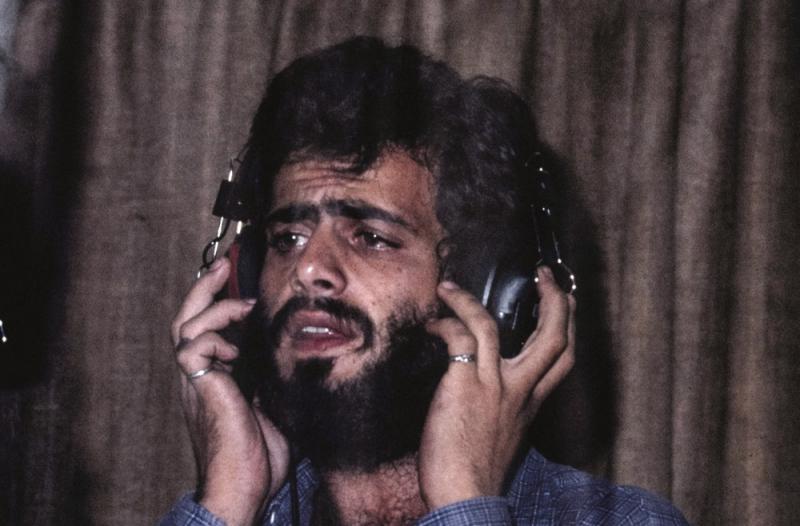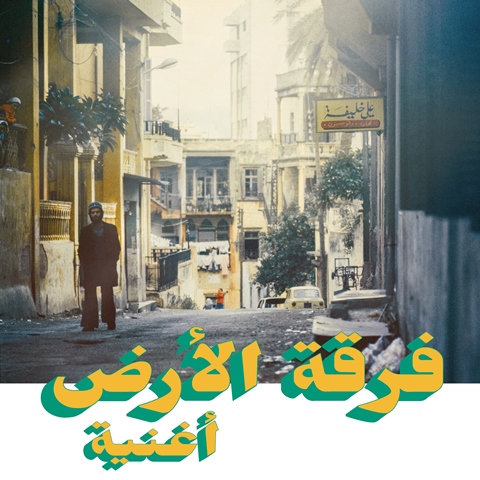Music Reissues Weekly: Ferkat Al Ard - Oghneya | reviews, news & interviews
Music Reissues Weekly: Ferkat Al Ard - Oghneya
Music Reissues Weekly: Ferkat Al Ard - Oghneya
Superb Lebanese album belatedly gets the recognition it deserves

Oghneya opens with the extraordinary “Matar Al Sabah.” Jazzy, with an overt Brazilian feel it gently swings and swoons. Wordless backing vocals and pulsing but gentle strings add atmosphere. Milton Nascimento comes to mind but the intimate lead voice also feels French, a little bit Julien Clerc. It’s instantly impactful.
Despite what it evokes “Matar Al Sabah” opens an album issued in 1978 by Ferkat Al Ard, a band fronted by Lebanese singer Issam Hajali (full name Issam al-Hajj Ali). Hajali had spent time in Paris in 1976 and 1977, and Oghneya was recorded Beirut in 1977. The album was first issued on cassette only and a vinyl version of 200 copies followed in 1979. Although a couple of tracks are missing from the new edition – the band did not want them reissued and one of them is replaced by another track – it’s obvious Oghneya is quite something.
 Take the title track. Sharing its dreamy feel with “Matar Al Sabah,” it enfolds like a warming blanket. While exotic there’s those suggestions of familiar touchstones. In an interview in the booklet with the new reissue, Hajali says of the Brazilian influence that “the emphasis was there because of the Brazilian musicians that I had met here in Beirut before I left to Paris. I fell in love with Brazilian music directly before the civil war started when we had many Brazilian musicians playing in bars and cafes in Hamra and Zeitoune, which was the general area of the nightlife at the time. Beirut was booming. It was the golden era of Beirut nightlife, so musicians from all over the world came to the city.”
Take the title track. Sharing its dreamy feel with “Matar Al Sabah,” it enfolds like a warming blanket. While exotic there’s those suggestions of familiar touchstones. In an interview in the booklet with the new reissue, Hajali says of the Brazilian influence that “the emphasis was there because of the Brazilian musicians that I had met here in Beirut before I left to Paris. I fell in love with Brazilian music directly before the civil war started when we had many Brazilian musicians playing in bars and cafes in Hamra and Zeitoune, which was the general area of the nightlife at the time. Beirut was booming. It was the golden era of Beirut nightlife, so musicians from all over the world came to the city.”
Ferkat Al Ard were Issam Hajali (guitar, vocals), Toufic Farroukh (flute, saxophone) and Elia Saba (bouzouki, oud). Producer/arranger Ziad Rahbani (the son of famous Lebanese singer Fairouz: he was also making his own records) brought strings (cello and violins) and massed backing vocals on board. The album’s lyrics are by the Palestinian writers Mahmoud Darwish, Samih Al Qasem and Tawfiq Ziad. Of these, Hajali says “this by itself was a very distinct message that everyone understood. For our political friends, it was a way of supporting the culture but they also probably considered it a way to spread their political messages that we aligned with.”
Beyond Lebanon, the return of the superb Oghney has not come as the non sequitur it could have been as Mouasalat Ila Jacad El Ard, a Paris-recorded collection of material featuring Hajali from 1977, was issued in 2019. Hajali was also heard on the Fine Anyway, a Rogér Fakhr (who was on Mouasalat Ila Jacad El Ard) album issued last year. The way has been paved for Oghneya.
This first-ever easily available appearance of Oghney is very welcome. Unreservedly recommended.
- Next week: Cult of Judex – bracing compilation of US garage-rock combo The Judex
- More reissue reviews on theartsdesk
- Kieron Tyler’s website
Explore topics
Share this article
The future of Arts Journalism
You can stop theartsdesk.com closing!
We urgently need financing to survive. Our fundraising drive has thus far raised £49,000 but we need to reach £100,000 or we will be forced to close. Please contribute here: https://gofund.me/c3f6033d
And if you can forward this information to anyone who might assist, we’d be grateful.

Subscribe to theartsdesk.com
Thank you for continuing to read our work on theartsdesk.com. For unlimited access to every article in its entirety, including our archive of more than 15,000 pieces, we're asking for £5 per month or £40 per year. We feel it's a very good deal, and hope you do too.
To take a subscription now simply click here.
And if you're looking for that extra gift for a friend or family member, why not treat them to a theartsdesk.com gift subscription?
more New music
 Music Reissues Weekly: The Earlies - These Were The Earlies
Lancashire and Texas unite to fashion a 2004 landmark of modern psychedelia
Music Reissues Weekly: The Earlies - These Were The Earlies
Lancashire and Texas unite to fashion a 2004 landmark of modern psychedelia
 Odd times and clunking lines in 'The Life of a Showgirl' for Taylor Swift
A record this weird should be more interesting, surely
Odd times and clunking lines in 'The Life of a Showgirl' for Taylor Swift
A record this weird should be more interesting, surely
 Waylon Jennings' 'Songbird' raises this country great from the grave
The first of a trove of posthumous recordings from the 1970s and early 1980s
Waylon Jennings' 'Songbird' raises this country great from the grave
The first of a trove of posthumous recordings from the 1970s and early 1980s
 Lady Gaga, The Mayhem Ball, O2 review - epic, eye-boggling and full of spirit
One of the year's most anticipated tours lives up to the hype
Lady Gaga, The Mayhem Ball, O2 review - epic, eye-boggling and full of spirit
One of the year's most anticipated tours lives up to the hype
 Slovenian avant-folk outfit Širom’s 'In the Wind of Night, Hard-Fallen Incantations Whisper' opens the door to inner space
Unconventional folk-based music which sounds like nothing else
Slovenian avant-folk outfit Širom’s 'In the Wind of Night, Hard-Fallen Incantations Whisper' opens the door to inner space
Unconventional folk-based music which sounds like nothing else
 'The Art of Loving': Olivia Dean's vulnerable and intimate second album
Neo soul Londoner's new release outgrows her debut
'The Art of Loving': Olivia Dean's vulnerable and intimate second album
Neo soul Londoner's new release outgrows her debut
 Music Reissues Weekly: The Peanut Butter Conspiracy - The Most Up Till Now
Definitive box-set celebration of the Sixties California hippie-pop band
Music Reissues Weekly: The Peanut Butter Conspiracy - The Most Up Till Now
Definitive box-set celebration of the Sixties California hippie-pop band
 Doja Cat's 'Vie' starts well but soon tails off
While it contains a few goodies, much of the US star's latest album lacks oomph
Doja Cat's 'Vie' starts well but soon tails off
While it contains a few goodies, much of the US star's latest album lacks oomph
 Mariah Carey is still 'Here for It All' after an eight-year break
Schmaltz aplenty but also stunning musicianship from the enduring diva
Mariah Carey is still 'Here for It All' after an eight-year break
Schmaltz aplenty but also stunning musicianship from the enduring diva
 Album: Solar Eyes - Live Freaky! Die Freaky!
Psychedelic indie dance music with a twinkle in its eye
Album: Solar Eyes - Live Freaky! Die Freaky!
Psychedelic indie dance music with a twinkle in its eye
 Album: Night Tapes - portals//polarities
Estonian-voiced, London-based electro-popsters' debut album marks them as one to watch for
Album: Night Tapes - portals//polarities
Estonian-voiced, London-based electro-popsters' debut album marks them as one to watch for

Add comment